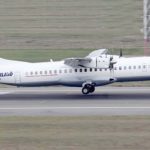
Nigeria has a large population of international travellers, which is average of about 4.5 million annually.
Over 90 per cent of these passengers are airlifted by foreign airlines. This is because Nigeria does not have local carriers that have successfully operated international destinations for a number of years.
So, most of the Bilateral Air Service Agreement (BASA) signed by the federal government tended to tilt in favour of the countries whose airlines operate into Nigeria.
This is because we do not have the capacity to reciprocate.
For example, South Africa Airways operates service to Nigeria daily. Nigeria does not have any airline that flies to South Africa, Virgin Atlantic and British Airways operate to Nigeria daily.
Nigeria has no airline that operates to London. It is the same with KLM, Air France, Turkish Airlines, Lufthansa and others.
Now that no Nigerian airline is reciprocating these flights into Nigeria, what is Nigeria getting from these airlines? In the past these airlines pay charges in return for non-reciprocity, which is known as BASA fund. A certain administration recently wanted to abrogate it. In fact, some airlines made unique arrangement with Nigeria that they have stopped the payment. And this has been upheld by succeeding regimes.
Many industry experts believe that Nigeria is losing at least $2.5 billion annually on capital flight by these airlines. The country is also not getting adequate payment for unreciprocated routes operated by foreign airlines. Put together, Nigeria may be losing over $6.5 billion annually to foreign airlines operation to Nigeria.
It is believed that if Nigeria establishes an efficient national carrier or supports its domestic airlines that have the capacity to operate international destinations, these losses would be curbed.
In pointing out the numerous gains of a national carrier, the Minister of State, Aviation recently noted that the airline would take advantage of BASA the country has with over 70 countries. It will also take advantage of the Africa Single Air Transport Market (SAATM) as a major player.
As a national carrier, the airline would be respected in the comity of nations and it would get involved in the aero politics; that when you snub the airline from operating to your country, as UK and Europe did to Medview and Arik Air in the past, Nigeria will reciprocate and also stop the airlines from those countries from coming to the country.
Beyond the national carrier, however, how can Nigeria begin to correct the lope-sided bilateral service agreements?
Industry consultant and CEO of BelujaneKonsult, Chris Aligbe, noted that before the defunct Nigeria Airways Limited (NAL) went under, it was the one that negotiated commercial agreement with foreign airlines and that as far as officials in the Ministry of Transportation are doing the negotiation, Nigeria would continue to be short-changed.
“We need strong carriers. The exploitation of Nigeria by foreign airlines started after the demise of Nigeria Airways. But the fact that it is not these foreign airlines that should be blamed; it is us that should be blamed. “This is because nobody allows a vacuum; once there is a vacuum something comes to fill it. If you know the huge amount of money that these airlines repatriate every day you will see the need why we need a national carrier,” Aligbe said.
The Chairman of the African Business Aviation Association (AfBAA) and the former Secretary-General of Africa Airlines Association (AFRAA), Nick Fadugba had once noted that it would be difficult to renegotiate some of the agreements.
“When I look at BASA in Nigeria, it is like we opened the stable door and the horses have gone and to catch it back it is going to be very difficult. We entered into BASA agreements with numerous countries, the principle of BASA is reciprocity and yet we entered into BASA and we are not able to reciprocate.
“Why? Because we don’t have the airlines and why don’t we have the airlines? It is because they are weak, small and under capitalised.”
Nigerian airlines led by the national carrier can also help reduce the capital flight. Industry experts believe that if Nigerian carriers can earn 40 per cent of what foreign airlines cart away from the country in foreign currency, it will up the value of the naira against other currencies and also add significantly to the nation’s GDP.
A major solution is what the Minister said about Fly Nigeria Act.
“As part of efforts to make airlines viable in Nigeria, the Ministry is making moves to have the National Assembly pass a fly Nigeria act. This act will require that anybody travelling on a ticket bought with public funds must travel on a Nigerian carrier unless the route is not served by a Nigerian carrier,” Sirika said.
This will be the significant move toward empowering Nigerian airlines and creating more jobs for Nigerians.






